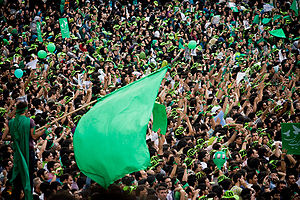
- Image via Wikipedia
By Chuck Fisher
Peace & Justice Editor
Should we hate Iran, love them, pity them, ignore them? What if we just bomb them? Nothing solves problems like kilotons! What do we do? On one hand there is a very repressive government and on the other hand there is a large proportion of the Iranian populous who want reform and democracy. The situation in Iran is very complicated and convoluted, yet America must find a way to strike peace or at least stability with one of the most geopolitically important regional powers in the Middle East.
Iran and the US have never been on the best of terms with each other. In 1953, the CIA overthrew the democratically elected Iranian government in favor of Shah Pahlavi who was supportive of the US. In 1979, the Iranian people overthrew the repressive Shah and created a state run by fundamentalist Shi’a Islamists. The American embassy was also stormed by Iranian students who took 52 Americans hostage for 444 days. During the Iran-Iraq War of the 1980s, the US gave money and weapons to Saddam Hussein who used chemical weapons against Iranian troops. The US and Iran have not had formal diplomatic relations since the Shah’s overthrow and both nations still leer at each other. Which brings us to today…..
The Islamic Revolution, as the 1979 overthrow was called, promised to reform the corrupt and secular government of the Shah by putting in place a more egalitarian system based on Islamic principles. Three decades later, the Islamic Republic of Iran is far from perfect. Unemployment is over 11% (CIA World Fact Book), state censorship is prevalent, and the threat of facing prison time for speaking against the government is a real possibility. In many ways, it would appear that the Islamic Revolution has become exactly what it attempted to destroy in 1979.
The angst of the Iranian people exploded last summer when presidential elections were held between the current president, Mahmoud Ahmadinejad, and the reform candidate, Mir-Hossein Mousavi. Ahmadinejad was declared the winner and the election was certified by Iran’s Supreme Leader Ali Khamenei, who in reality is the actual leader of the country. Thousands upon thousands of Iranians turned out in the streets of the capital, Tehran, to protest the results due to widespread reports of voter fraud. Over a hundred people were arrested and many more were violently beaten by government security forces. One particular protester, Neda Agha-Soltan, a 27 year old woman, was shot and killed. Her death was filmed and circulated around the world on the internet as a rallying cry against the brutality of the Iranian government. Protests have been continuing on and off since last summer, but many of these have been stifled and the opposition is losing steam.
In addition to a repressive domestic policy, Iran’s foreign policy is making the outside world cringe. Iran is currently pursuing nuclear technology, claiming peaceful purposes, but which at some point in the future may result in a nuclear weapon. Combining a potentially nuclear country with anti-Western and anti-Israeli rhetoric will lead many Americans to become concerned about Iran and stability in the Middle East.
So the outside world must walk a thin line. We want to liberate the Iranian people and see the dreams of democracy fulfilled by the people, yet we also want to prevent the current government from making a very large bomb. If we attack Iran’s nuclear facilities, as Israel has hinted at, it could embolden and anger the Iranian government who might retaliate. The Iranians could drop mines in the Strait of Hormuz, a narrow seaway through which 20% of the world’s oil passes, or they could activate their proxy terrorist group Hezbollah to attack Israel from Lebanon like the group did in 2006.
Conversely, if we attempt to finance, influence, or support the Iranian reformers it may de-legitimize them because the reformers may appear to be merely foreign puppets. All Iranians agree they do not want foreign intervention and almost 60 years later there is still soreness over the 1953 American fomented coup d’état which brought to power the hated Shah. Ironically, the last way America could help these people would be by……actually helping these people.
To complicate the issue, many Iranians, even reformers, want to see Iran as a nuclear state. Nuclear power brings a sense of national pride through technological achievement. Furthermore, assessments by journalist Robin Wright in her book, Dreams and Shadows, show that although Iran is an oil rich country, more and more of that oil is being diverted to domestic use and less and less is being sold abroad, which in turn hurts the Iranian economy. In order for Iran to remain competitive and economically solvent, the nation may need to turn to nuclear power to solve its energy needs. Bombing the nuclear research facilities will turn the population as a whole against the foreign invaders who are hurting their fragile economy and national pride. The reformers may ally themselves with the government, a further complicating situation.
So how should the United States proceed? We need to stop Iran from building a nuke while at the same time try to encourage reform without overtly or covertly trying to encourage reform! Ah the joys of Catch-22! At this point the Obama Administration has been taking a very moderate and tempered approach including negotiation and dialogue. The deal trying to be struck with Iran would allow it to possess and use nuclear material but processing and enrichment would occur in an outside country such as France or Russia, however this deal has been rejected in its various forms and Iran has continued to enrich its Uranium.
Hate them, love them, bomb them? It is nowhere near an easy situation, but one will need to face…..for ourselves as well as for Iran.
Related articles by Zemanta
- Protesters, police clash in Iran’s capital (msnbc.msn.com)
- Iran Standoff Heats Up With Ahmadinejad Nuclear Claim (Update1) (businessweek.com)



![Reblog this post [with Zemanta]](https://img.zemanta.com/reblog_e.png?x-id=96d3bc7c-0ebe-47a1-9414-eed0c0813432)






